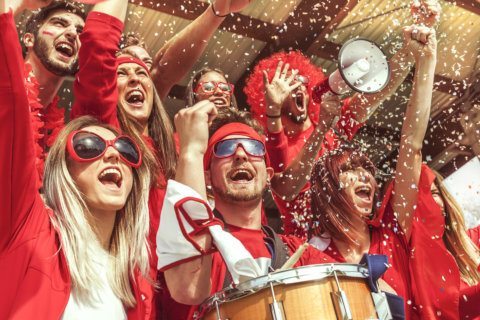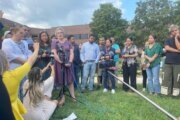A prominent advocacy group for college athletes announced Thursday it opposes the $2.8 billion settlement agreement of antitrust litigation facing the NCAA and major college conferences, saying a plan for schools to share athletics revenue will actually limit the earning potential of the athletes.
The National College Players Association said the so-called House settlement aims to eliminate booster-funded collectives that are currently responsible for millions of dollars in payments to college athletes for the right to use their names, images and likenesses.
“This is an unjust settlement that would not only harm current athletes but future college athletes who are only in fourth grade,” NCPA executive director Ramogi Huma said.
A court hearing is scheduled for next Thursday, where a federal judge in California could rule on the plaintiffs’ request for preliminary approval of the deal, which includes $2.78 billion in damages to former and current college athletes. Several requests to deny preliminary approval have already been filed, including one from the plaintiffs of another antitrust lawsuit filed in Colorado who declined to be part of the settlement agreement.
Even if granted preliminary approval, challenges to the settlement can still be brought before final approval in the months ahead.
“The NCPA will work to get this settlement rejected so that parties can come up with a fair settlement or go to trial,” Huma said in a statement. He declined to detail the NCPA’s strategy.
Steve Berman, a Seattle-based lawyer for the House plaintiffs who negotiated the settlement, said he hasn’t seen evidence that NIL collectives are going to be put out of business by the terms of the NCAA settlement. He added the NCAA already has rules banning NIL payments that are disguised pay-for-play enticements.
“Those rules are currently subject to enforcement by the NCAA as judge, jury and executioner,” Berman said. “The settlement does not prohibit the NCAA from continuing to have such rules against pay-for-play payments by boosters and collectives, but it sets up a neutral arbitration system for athletes and schools to challenge the application of such rules so that they will have more rights than they have now to limit the power of the NCAA with respect to collectives.”
The NCPA also said it opposes the deal because it gives conferences the ability to end proposed revenue-sharing if athletes are deemed to be employees with the right to collectively bargain with schools or leagues. That topic is the subject of several fights likely to end up in court, including a unionization effort by the Dartmouth men’s basketball team.
Marc Edelman, a sports law professor at Baruch College in New York, called the settlement agreement a “meaningful and innovative” attempt to change the way college athletes are compensated. He also agreed with the NCPA’s concerns about the plan to set a cap on the amount of revenue schools will be permitted to share with athletes and cutting off third-party compensation from those deemed by the NCAA to be boosters.
“He discusses very real concerns,” Edelman said.
Huma confirmed group licensing organization OneTeam Partners, which works with the NFL Players’ Association, had emailed thousands of college football players recently, encouraging them to join the NCPA. He said the outreach was not related to the NCPA announcing its opposition to the settlement proposal.
Jim Cavale is the chairman of Athletes.org, which is trying to organize athletes and said it already has nearly 4,000 members. He called the House settlement a huge step in the right direction.
“When it comes to the terms it’s not perfect because the athletes weren’t involved,” he said. “That’s the umbrella problem in college sports. The only sustainable solution is a partnership between athletes and schools.”
Cavale said he believes the settlement will ultimately receive final approval, but that athlete-led challenges to certain terms could lead to changes in the final version that could provide them the right to negotiate revenue-sharing contracts with their schools.
Huma, a former UCLA football player, and the NCPA have been at the forefront of pushing for reforms in college sports and more benefits for athletes for decades.
The NCPA filed a complaint in 2022 with the National Labor Relations Board in California, asking that USC athletes be deemed employees of the school and its conference. A final ruling is pending. In the Dartmouth case, a NLRB regional director did rule that the basketball players should be considered employees and gave them the go-ahead to vote to join a union.
The school is challenging that ruling.
The NCPA says the settlement also does not do enough to ensure schools won’t cut revenue sports and could result in a decrease in athletic scholarships being made available by the wealthiest programs.
___
Follow Ralph D. Russo at https://twitter.com/ralphDrussoAP
___
AP college football: https://apnews.com/hub/college-football
Copyright © 2024 The Associated Press. All rights reserved. This material may not be published, broadcast, written or redistributed.





